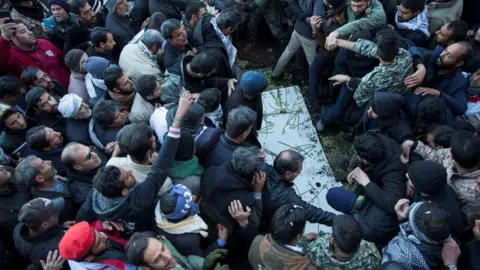Iran's attack: Is there more to come?

 Reuters
ReutersGiven the significance of General Qasem Soleimani and the passions that his killing aroused, Iran's military strike against US bases in Iraq was a modest response.
Iran is claiming to have inflicted significant US casualties but this does not appear to be the case. The US says that its radars provided warning of the attacks and the Iranian missiles appear to have landed in areas where there were no US forces present.
The question now is what happens next. Is this the end of Iran's retaliation? Only time will tell.
Any dramatic Iranian response - the assassination of a high-ranking US officer for example - would take time and depend upon both detailed planning and opportunity.
Iran said that it would respond. It said that the response would come from the Iranian military and not an ally or proxy. And in using missiles, fired from within Iran itself, Tehran has done what it said it would.
Indeed the initial mood music from both Tehran and Washington suggests the potential for de-escalation.
President Trump's initial tweet was mild and seemingly reassuring about the absence of US casualties. The Iranians too seem to be signalling - for all the continuing threats - that this could be the moment for both sides to pause and take breath. It is clear that neither the US nor Iran, for all their rhetoric, want a wider conflict.
So this could be a moment to try to reduce tensions. But this is just a dangerous spike in an unfolding competition between Iran and the US for regional influence. It is hard to see Iranian policy changing. It is still going to try to secure its regional goals, not least, the departure of US forces from Iraq. The Soleimani killing has weakened the US position there. US officials insist that they have no desire or reason to pull out.
The Iraqi parliament has called for a withdrawal of US forces, but the resolution has no legal weight. Iraq's current political difficulties mean any formal decision on the future of the US presence could be some time away. But many analysts believe that Washington's position in Iraq is more tenuous than it was a few weeks ago.
It is also important to remember that this episode of direct confrontation between Tehran and Washington was preceded by a long-running Iranian campaign over many years to hamper US activities in the region. Indeed it was rocket attacks from Iran's proxies - a local Shia militia - against US bases in Iraq that formed the prelude to this recent crisis. This then raises a whole series of questions.
In killing the Quds Force leader Gen Soleimani has the US now established any measure of deterrence? Will Tehran seek to constrain its allies in the region to avert further attacks against US bases or interests? And if not, will Iranian-inspired attacks resume in due course? What will President Trump do then?
So is this crisis over? This could be the end of one particularly dangerous episode, but the bitter regional tensions and strategic rivalry remain. Gen Soleimani's death is going to cast a shadow over the interactions between the US and Iran for many years to come.
